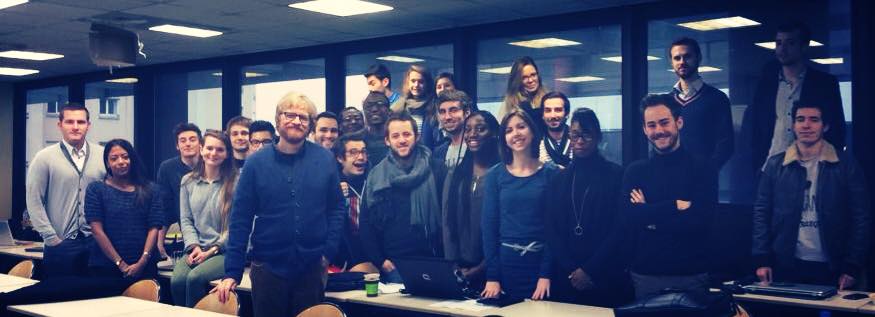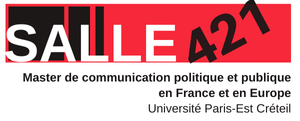
Tuesday 2nd December 2014, the students in the Master 1 Political and Public Communication in France and Europe had the pleasure of receiving Joss Hands, a reader in media and critical theory and Director of ARCMedia (Anglia Research Centre in Media and Culture) at Anglia Ruskin University, Cambridge.
Joss’s research deals with the relationship between the media, culture and politics. He gave a three hour lecture about the concept of the public sphere, addressing the concept itself, the background, the roles of the media and the Internet. This important concept comes up in various classes in other teachings, and in current political topics, as for example in the notion of a “European public sphere ».
The main topics that we will retain from this course led by Joss Hands:
The notion of “public sphere”
After a quick return on the definition of the public sphere, which recalled Habermas’s theory of “a sphere between civil society and the state, in which critical public discussion of matters of general interest was institutionally guaranteed”, we have put forward various arguments that promote the concept of Habermas, as:
– To arrive at conclusions through reasoned debate.
– To convince someone of our view point, without using manipulation.
The public sphere and the media
Historically, from the late 18th century, media forms such as newspapers acted as a visible form of public discussion. Although the media has always been central to the Public Sphere, Habermas sees a decline since the 19th century and the colonization of the Public Sphere “lifeworld” by the money and power system.
We made a link with our time, and wondered: How has the public sphere been transformed?
Following an exchange of questions / answers, we came to the following negative conclusion:
For some people, the press has been commercialized with advertising. Advertising is important but it destroys the Public Sphere. Some newspapers have become machines that exist only to make money. Their interest is to appeal to the audience so as to increase sales, which sacrifices real debate and discussion.
Considering television, the Public Sphere has become narrower. This is a barrier because when journalists or people have some points of view, they are not considered because of the editorial line of the media and the impact it could produce on the audience.
The Public Sphere according to Habermas has developed in two main ways:
– The range of interests competing within the Public Sphere now needs to be managed by the state and the law but in a more or less conflicting private interest.
– The success of the Public Sphere in establishing what Habermas calls a “Bourgeois constitutional state” meant that the press could abandon its polemical position and take advantage of the earning possibilities of a commercial undertaking. The result was that the Public Sphere was transformed by the influx of private interests.
The public sphere and Internet
Joss Hands began by highlighting the fact that there are many more arguments in favor of eDemocracy, than against.
On the one hand we have the internet considered as a distributed network that produces a lot of content to increase communication and access to elected officials. The advantages: connecting with elected officials, diffusing your message, and bringing together several people simultaneously across the screen.
On the other hand we have the fact that the problems with democracy are not just logistic ones but embedded in democracy itself, requiring a total rethink, not the application of technology. People today do not vote anymore. For Joss Hands, online voting does not solve the problems.
To find an agreement point, Joss Hands made reference to Dahlberg and his conditions for a digital Public Sphere:
– “Autonomy from state and economic power”. It must be an authentic public space rather than one dominated by state or corporate interests. Internet should restrict its commercial aspect.
– “Ideal role taking”. Recognizing the value of others and ensuring mutual recognition, makes for good argument and development of ideas.
– “Sincerity” for obvious reasons. Away from internet we are not necessarily able to say what we believe, whereas on the web, through anonymity, we can give our true opinions.
– “Discursive inclusion and equality” rooted in the ideas of a public sphere available to all on fair terms.
The different elements, particularly the third theme dealing with the Internet, lead us to the subject of the new players appearing on the web and introduce topics which are debates. We expressed our opinions on the specific case of WikiLeaks and made a parallel with its equivalent in France, Médiapart.
Case study in radical internet politics : Wikileaks
Next, Joss Hands talked about Wikileaks, a website set up for « whistle blowers » in 2006 by Julian Assange.
The website is made in a way that people can be anonymous, which is important because of the risks whistle blowers take. It takes advantage of the distributed nature of the internet to allow access to classified and sensitive documents. It uses multiple servers and also has a number of different domain names to make sure it is difficult to block or take offline.
Its stated purpose is « to bring important news and information to the public … One of our most important activities is to publish original source material alongside our news stories so readers and historians alike can see evidence of the truth »
It describes itself as « an innovative, secure and anonymous way for sources to leak information to (Wikileaks) journalists » and an « uncensorable system for untraceable mass document leaking »
The most important thing is open access and freedom of information as a democratic principle : « We believe that transparency in government activities leads to reduced corruption, better government and stronger democracies. All governments can benefit from increased scrutiny by the world community, as well as their own people. We believe this scrutiny requires information. Historically, that information has been costly – in terms of human life and human rights. But with technological advances – the internet, and cryptography – the risks of conveying important information can be lowered »
Wikileaks encountered early successes including a tax avoiding Swiss bank, government corruption in Kenya, 9/11 text message, etc.
But they are known for a big one in particular : in 2010, they revealed encrypted files of data from US intelligence communications. Bradley Manning, a US army intelligence analyst, had access to many classified communications and documents via the central computer networks of the armed forces and the State Department, which he tapped into. He accumulated around 500,000 classified documents on the wars in Iraq and Afghanistan, which included CIA detainee interrogation videos.
This case had a big impact because it revealed a lot of bad behaviour from the US government : civilian casualties much higher than reported, secret US assassination squads, abuse and torture by US occupying and local forces …
One of the revelations was « Cablegate » with a lot of embarrassing revelations about illegal eavesdropping and general chatter between embassies, which exposed US relations with other countries around the world.
This case had a lot of consequences for Wikileaks. Its creator, Julian Assange is still on the run and accused of rape and “disregard” of human life, and, by some people, he is considered to be a terrorist and there are demands, from many quarters, that he be prosecuted, even assassinated.
Visa, MasterCard and PayPal start to refuse to process donations to Wikileaks, and Amazon shut down the Wikileaks hosting servers. After that, « Anonymous » got involved and attacked Amazon among others.
